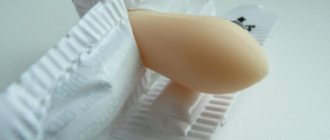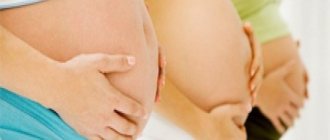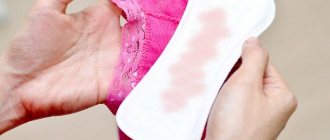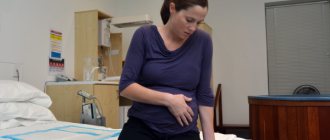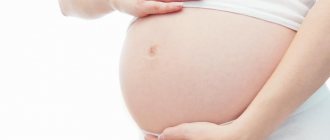Is it possible to use belladonna preparations before childbirth?
In gynecology, the attitude towards belladonna suppositories is contradictory. The reason for this is the lack of scientific data on the safety of the drug’s effect on mother and child. One thing is clear, the active substance - belladonna - has a toxic effect on the body. Some gynecologists believe that prescribing the drug is dangerous in the first and second trimester, and even useful before childbirth. Another part of doctors treats the drug very carefully at any stage of gestation. It gets to the point where one doctor prescribes it for the same woman and another cancels it.
The famous obstetrician-gynecologist E.P. Berezovskaya, who bases her work on modern standards of treatment, considers prescribing belladonna suppositories, as well as other stimulating drugs before childbirth, a stupid decision.
What is the drug
Belladonna candles are made from the poisonous belladonna plant. In modern folk medicine, weed is practically not used. The effect of the drug is ensured by alkaloids of the atropine group.
Atropine, which is part of the plant, can cause severe agitation in a person, reaching the point of rage.
Wikipedia
https://ru.wikipedia.org/wiki/Belladonna
Belladonna suppositories are recommended for the treatment of hemorrhoids and anal fissures in adults. The content of the active substance in the drug is 15 mg. In a small dosage, belladonna extract has an antispasmodic, analgesic, wound-healing effect, and reduces the tone of the gastrointestinal tract.
A very beautiful, but poisonous plant: popularly called “wolf berries”
The official summary indicates that the use of belladonna suppositories during pregnancy and breastfeeding is prohibited. This situation is explained by the toxicity of the drug and little knowledge of the effects on the body of the mother and child.
Belladonna penetrates the systemic bloodstream and can cause a number of side effects. It is difficult to predict how belladonna will affect the health of an unborn baby. Therefore, the prescription of belladonna by some doctors to pregnant women looks paradoxical. There is no consensus in medical circles about the need to use suppositories during pregnancy and before childbirth.
The purpose of rectal suppositories with belladonna during pregnancy before childbirth
Belladonna or belladonna is considered a poisonous substance, but thanks to its active components, this plant is widely used in pharmaceuticals, homeopathy and herbal medicine, and is of great benefit in treatment . Due to the high content of alkaloids, belladonna is able to assist in the processes of analgesic, anti-inflammatory, antispasmodic, and antiseptic effects.
Suppositories containing natural belladonna extract affect the body in the following way:
- Helps in the healing of various anatomical injuries in the anus if there are hemorrhoids;
- It is an anti-inflammatory agent during the formation of necrotic symptoms in muscle tissue;
- Relieves pain and discomfort during hemorrhoidal manifestations;
- Prevents the growth and development of microbes and harmful bacteria;
- Belladonna suppositories during pregnancy soften the cervix during childbirth, reduce pain and promote its rapid opening.
For what purpose is belladonna prescribed to expectant mothers in recent weeks?
Belladonna suppositories are prescribed to adult patients with hemorrhoids and anal fissures. The use of the drug before childbirth for the purpose of relaxing the cervix is not recorded in the official instructions, therefore, cannot be considered an objective reason. But in practice, Russian gynecologists prescribe suppositories with belladonna to some patients, sometimes combined with No-shpa and other means. As a rule, the drug is not prescribed in the first and second trimester. Most often, doctors recommend suppositories with belladonna at a later date, after 38 weeks.
The drug has a laxative effect on the intestines. Since the uterus is nearby, a similar effect extends to it. It is believed that belladonna suppositories, used shortly before childbirth, help relieve tension from the uterus and relax the cervix. These actions can:
- facilitate the process of dilation of the cervix during childbirth;
- slightly reduce pain from contractions;
- soften the passage of the child through the birth canal;
- reduce the risk of ruptures;
- reduce the likelihood of developing hemorrhoids after childbirth.
In cases where the baby is in no hurry to be born, the drug can speed up the approach of birth. But, like any medicine, belladonna suppositories act on each pregnant woman individually. An analysis of reviews from expectant mothers using the drug showed that the medication is quite insidious . You don't know what to expect from him. The spectrum of action of suppositories on the body is very wide: from a successful birth to a host of negative consequences, even miscarriage.
In what form is it produced?
The medicinal product Belladonna extract is available in the form of rectal suppositories, which have a creamy, white or light brown tint, depending on the type of fat base used in the manufacturing process of the drug. The manufacturer of suppositories admits the presence of a slight coating that forms on their surface during long-term storage.
Belladonna extract suppositories have a pronounced bullet-shaped shape, which allows you to administer the suppository quickly and with minimal discomfort. The drug is packaged in plastic blisters of 5 suppositories each.
The candles are packaged in a cardboard box, which is equipped with detailed instructions for using the medication. The average cost of the drug ranges from 22 to 39 rubles. for 10 suppositories.
Contraindications and side effects
Among the contraindications, the official instructions note:
- individual sensitivity to the substances of the drug;
- angle-closure glaucoma;
- disturbance of urine outflow;
- gastrointestinal diseases;
- intestinal atony;
- ulcerative colitis;
- chronic heart failure;
- tachycardia;
- myasthenia gravis;
- pregnancy phase;
- lactation period;
- age up to 18 years.
Suppositories should be used with caution for diseases of the endocrine system, heart pathologies, and kidney problems.
Side effects are presented in a wide list. Among them:
- allergic reactions;
- dry mouth;
- thirst;
- constipation;
- diarrhea;
- tachycardia;
- mydriasis;
- accommodation paresis (a critical condition of the eye, as a result of which it becomes impossible to examine small objects even at close range, the clarity of the eye lens is impaired);
- dizziness;
- photophobia;
- urinary retention.
An overdose of the drug is characterized by increased effects of side effects, up to serious poisoning.
During the treatment period, care must be taken when driving vehicles and engaging in activities that require attention, quick reactions and good vision.
Interaction with other drugs
Simultaneous use with some antidepressants increases the effect of side effects. Combined use with drugs that increase heart rate causes tachycardia. A mixture of alcohol (ethanol) and belladonna enhances the inhibitory effect on the central nervous system.
Contraindications to taking the drug
The list of side effects of the drug includes:
- visual impairment;
- cardiopalmus;
- thirst;
- dry mouth;
- tachycardia.
These symptoms are rare, but you need to be aware of their possible manifestation. If they appear, ask your gynecologist to replace them with sea buckthorn suppositories or papaverine.
Doctors are still arguing whether they can be prescribed to pregnant women. The abstract does not describe the effect on the body in an interesting position. The lack of research has led to the fact that some companies' lists of this drug include pregnancy and lactation. Gynecologists call this an attempt to avoid side effects.
Loose stools are one of the consequences of taking the medicine. For those who suffer from constipation, this is necessary. Some pregnant women may experience diarrhea.
Glaucoma and prostate adenoma are a contraindication to the use of belladonna suppositories.
Features of application
The official instructions recommend using belladonna suppositories rectally, 1 piece 2-3 times a day. The maximum dose is 10 suppositories per day. The duration of the course is determined by the doctor and averages 7–10 days. Suppositories should be used after bowel movements or a preliminary enema. The drug is injected deep into the anus . Before use, it is recommended to wash your hands and anus with warm water. After the procedure, it is advisable to take a horizontal position for some time.
However, when used before childbirth, the dosage regimen is different and is determined by the doctor who has taken upon himself the responsibility of recommending the drug to the woman.
Before inserting a candle into the anus, you should not hold it in your hands for a long time, otherwise it will melt
Features of use at different stages of pregnancy
The regimen for taking the drug Papaverine during pregnancy is determined by the attending physician. When prescribing a medication, the doctor takes into account the patient’s gestational age and the nature of the pathological process. The duration of use is also determined individually. In the case of uterine tone, the drug is discontinued as it is eliminated.
Some women think that with uterine tone, only intravaginal drugs can be used, so they have a question about where to insert the suppository. It should be borne in mind that Papaverine vaginal suppositories do not exist. The medicine is intended for rectal use. With accidental, one-time vaginal administration, there is no danger to the fetus, the drug is not able to influence the development of the baby in the womb. With constant violation of application technology, the risk of microflora disorders in a woman increases.
First trimester of pregnancy
Papaverine in the form of rectal suppositories is often prescribed to women in early pregnancy, in the first trimester, when there is a threat of spontaneous abortion. The product must not be used independently, without a doctor’s prescription; self-medication can lead to irreversible consequences.
If a threat of spontaneous abortion is detected, the drug is prescribed in injection form. The drug is used in a hospital setting, the drug is administered by drip or injection into a vein. The advantage of this form of release is the sufficient speed of obtaining a therapeutic result.
Second trimester of pregnancy
The second trimester of pregnancy begins at 14 weeks and most women believe that the risk of miscarriage has been completely eliminated by this point, but this opinion cannot be called correct. Stress can still provoke a miscarriage at this stage of gestation.
Increased tone is manifested by involuntary contractions of the uterus at intervals of several seconds. Particular danger appears if spotting is added to the condition. In this case, women are recommended to take the drug orally and use rectal suppositories. The condition is not always an indication for hospitalization.
Third trimester of pregnancy
In the third trimester, Papaverine suppositories are also recommended for uterine hypertonicity. Their use will prevent premature birth. Injection is not used at this stage of gestation.
In the 3rd trimester, Papaverine is used to stimulate the intensity of cervical dilatation if this condition is not provided by the body naturally. The drug may relax the cervix. To stimulate labor, suppositories are used in a dose of 1 suppository rectally 4 times a day. The duration of use is determined individually.
Papaverine is a myotropic antispasmodic intended to lower blood pressure and reduce heart rate. The drug acts on the muscles and is able to eliminate spasms of various origins; it is due to this feature that it is used in gynecological practice. The need to use the product is determined by a gynecologist, and the drug is prescribed for different periods.
Is there a replacement for belladonna candles?
Analogues of suppositories with belladonna in composition and indications are the drugs Betiol and Anuzol. Along with belladonna, they also contain other substances. Both medications are also contraindicated for use during pregnancy.
There are a number of drugs for the treatment of hemorrhoids and anal fissures (sea buckthorn suppositories, Relief, etc.), which are prescribed for hemorrhoids during pregnancy under the supervision of a doctor. However, they are, of course, not used to prepare the uterus for childbirth.
Compound
The table below lists the constituent components of the drug and also describes their pharmacological purposes.
| Active and auxiliary substances of the drug | Characteristics of biochemical components |
| Belladonna extract | This is the active substance of suppositories, which has a natural base. The juice of the medicinal plant belladonna contains a high level of alkaloids, which have a toxic effect. Their dosed use provides local analgesic, antispasmodic and anti-inflammatory effects. The main extractant of belladonna is ethanol 20% concentration. In terms of the total amount of alkaloids, the content of the main substance in 1 suppository is 0.015 g. |
| Phenol | Phenol is an auxiliary component of candles, which acts as a stabilizer and preservative. This substance prevents the chemical decomposition of the main component of suppositories during storage. |
| Hard fat | This is an excipient of the drug that forms the basis of rectal suppositories. In the production process of the medicine, fats of vegetable origin are used, which have undergone industrial processing and purification from harmful impurities. |
Belladonna extract is a suppository (reviews of the medication indicate its high therapeutic effectiveness), which have a natural biochemical composition and also have a minimal number of side properties.
Reviews
Svetlana:
They prescribed me belladonna suppositories a week before my due date in order to give birth faster. I can’t say anything good about them, because on the very first day of use I had side effects. There was a severe upset bowel movement, a small rash appeared on the hands and face, and nausea was tormented. The next day I went to the doctor, it turned out that I was intolerant to this drug. They prescribed another medicine.
Irina:
I started introducing suppositories five days before giving birth. When the contractions started, my cervix dilated quite quickly. Judging by the way the woman in labor was screaming from the next room, my pain was not so strong, it was tolerable. Perhaps thanks to the belladonna. She gave birth in two and a half hours.
Catherine:
I don’t know who benefited from belladonna suppositories before childbirth, but they definitely didn’t help me. I put them on for four days, I felt disgusting, my lower abdomen hurt. Then labor began, which dragged on for quite some time. The neck did not want to open to the required levels. As a result, when the baby started to go, it tore a little.
Faith:
The gynecologist prescribed suppositories seven days before the due date. I did everything in accordance with the instructions and recommendations. In parallel with belladonna therapy, I drank no-shpu. Labor began a day earlier. The cervix opened quickly. The pain was quite tolerable, and after the birth of the child there were no ruptures. In principle, I am satisfied. I think this is thanks to the suppositories.
Clinical pharmacological group
Suppositories with belladonna extract relieve pain, relieve inflammation, and relieve spasms in hemorrhoidal and proctological pathologies. The medication is prescribed for the rapid regeneration of cracks in hemorrhoids and after surgical treatment of the rectum.
Thanks to the active components included in the belladonna suppository, cholinergic receptors are blocked with a decrease in their sensitivity. At the same time, intestinal peristalsis becomes slower, muscle spasms appear less frequently and with less intensity. The drug helps block nerve impulses to the rectum.
Suppositories are considered an antihemorrhoidal agent, but its effectiveness has been approved by gynecologists and gastroenterologists. In some cases, the drug is used for therapy in the respiratory and cardiovascular systems.
No beauty! About contraindications
There are several cases when suppositories with belladonna extract are strictly prohibited during pregnancy. You cannot resort to their help for the following conditions and diseases:
- individual intolerance;
- intestinal obstruction;
- disturbances in the functioning of the heart;
- glaucoma;
- predisposition to bleeding;
- hyperthyroidism;
- renal pathologies.
Important! After the baby is born, you should immediately stop using these suppositories so as not to lose breast milk: they stop the lactation process.
Analogues of the drug
Belladonna is a common element for making suppositories against hemorrhoids. There are several drugs in this group in pharmacies that are recommended for use.
The drug, in addition to belladonna extract, also contains other active ingredients:
- zinc sulfate;
- bismuth tribromophenolate.
The medicine has antiseptic, astringent, antipruritic, drying and antispasmodic effects. The effect occurs after a quarter of an hour of the presence of the suppository inside the anus.
When all the ingredients of the drug are completely absorbed into the blood, they continue to act for at least another 2 hours. It is recommended to use Anuzol 1-3 times daily - it all depends on the severity of the pathology.
Candles with this name successfully combine ichthyol and belladonna extract. Thanks to this, the drug relieves pain while simultaneously helping to eliminate various inflammations. The presence of side effects with suppositories is extremely rare. The drug perfectly relieves pain, eliminates inflammation and spasms.
Belladonna extract detailed instructions for use
The medication is indicated in a number of the following pathologies:
Discomfort in the anorectal area
- inflammation, severe discomfort of the intestines and digestive tract;
- hemorrhoidal pathologies;
- anal fissures;
- infectious processes;
- swelling;
- burning;
- weakening of the sphincter;
- stool setting;
- resorption of congestion in hemorrhoids;
- healing of injured tissues;
- prevention of hemorrhoids;
- prostatitis;
- diseases of the genitourinary system in men.
Dosage and duration of treatment
It is forbidden to use belladonna suppositories for hemorrhoids without control. This is due to the poisonous qualities of the plant. There are patients who think that the more often the drug is administered, the faster the therapeutic effect will be visible. Despite the naturalness of the drug, suppositories are prescribed with the permission of the attending physician.
Usually, for medicinal purposes, it is recommended to use no more than 3 suppositories per day. In some cases, it is possible to prescribe 10 suppositories during the day. The duration of the treatment course depends on the severity of the pathology and the characteristics of the patient’s body. The basic treatment regimen lasts 5 days. All prescriptions are made by the attending physician.
Suppositories are used on cleansed intestines with an enema, after hygiene procedures.
pharmachologic effect
Belladonna extract form rectal suppositories have the following effects:
Candles contribute to:
Anatomy of the rectum
- preventing the stimulating activity of acetylcholines;
- decreased secretion (saliva, sweat, gastric juice, bronchial mucus) of glands;
- decreased pancreatic secretion.
Atropine can suppress tone in the bronchial muscles, bile ducts, stomach, intestines and abdominal cavity as a whole. The phenol contained in the suppository has a laxative effect. With a pronounced antispasmodic effect, the muscles of the uterus also relax. This feature of phenol allows the medication to be used in preparing the female body for bearing a child and childbirth. In this case, suppositories containing belladonna are prescribed to pregnant women.
The medication is an excellent antiseptic, which allows the use of suppositories for hemorrhoid therapy. The medicine relieves spasms, inflammation, and stops infection.
Vaginal suppositories for the treatment of gynecological inflammations
All vaginal suppositories aimed at combating inflammatory processes are divided into two groups:
- Steroids - containing hormones of natural or synthetic origin;
- Non-steroidal - in which the hormonal component is absent.
For thrush (fungal infection):
- Klion D
- Irunin
- Trichocide
- Econazole
- Polygynax
- Betadine.
When treating erosions (pathological changes in tissue with heavy discharge, more about this disease in the article: “Cervical erosion: symptoms, treatment, folk remedies for combating cervical erosion”):
- Livarol
- Galavit
- Depanthol
- Sea buckthorn candles
- Suporon
- Polygynax
For inflammation of the appendages (inflammation of the ovaries and/or fallopian tubes):
- Terzhinan
- Movalis
- Mikozhinaks
- Fluomizin
- Polyjinx
- Flamax
For cystitis - how to recognize it, it is written in the article: “Causes and symptoms of cystitis in women, prevention and treatment at home with folk remedies, antibiotics and other drugs”:
- Candles with palin
- Syntomycin suppositories
- Betadine
For vaginitis (inflammation of the vaginal mucosa):
- Meratin-combi
- Polygynax
- Terzhinan
- Betadine
For genital herpes (blistering inflammations on the genitals):
- A-interferon
- Vitaprost
- Poludan
- Viferon
To restore vaginal microflora:
- Bificol.
- Longidaz.
- Bifidumbacterin.
- Vagilak.
- Lactonorm.
- Acylact.
Indomethacin suppositories are rectal, non-steroidal. The active ingredient, indomethacin, is 50–100 mg per suppository. The drug is prescribed for the following gynecological diseases:
- inflammation of the appendages;
- diseases of the reproductive organs;
- disruptions in menstrual cycles;
- myoma;
- cyst;
- inflammatory processes in the uterine cavity.
Today, pharmacies sell indomethacin suppositories from three manufacturers:
- Russia, "Altpharm" - contain 100 mg of active substance.
- Germany, “Berlin-Chemie” – containing 50 mg of indomethacin.
- Bulgaria, Sopharma - suppositories containing both 100 mg and 50 mg of active ingredient are sold.
The recommended dosage is 1-3 suppositories during the day. In some cases (for example, with hemorrhoids), the doctor may increase the number of suppositories to 10 pieces. On average, the duration of treatment is from 5 to 7 days.
Suppositories with belladonna extract should be prescribed in a clinic or hospital.
Recommendations:
We must not forget to be careful when taking belladonna extracts. An excess of plant alkaloids will negatively affect the well-being of patients
In large quantities, the elements act as poison. Pregnant patients can use suppositories, but with caution, especially in late gestation. On the other hand, a candle with belladonna helps prevent the development of hemorrhoids in women who are expecting a child.
Candles can relieve cramps on critical days. The herbal remedy acts gently during exacerbation of hemorrhoids.
Drug interactions
The active substance of Belladonna extract suppositories enters into medicinal interactions with the following types of drugs:
- monoamine oxidase inhibitors - cause heart rhythm disturbances;
- Quinidine and Novocainamide - the antispasmodic and analgesic effect of belladonna alkaloids is enhanced;
- drugs from the group of opiates - suppositories reduce the analgesic properties of narcotic drugs;
- Diphenhydramine and Diprazine - the therapeutic effect of Belladonna extract becomes more pronounced;
- Haloperidol and drugs from the corticosteroid category increase intracranial pressure;
- Sertraline - the patient experiences depression and suppressed psycho-emotional reactions;
- antibacterial drugs from the penicillin category - enhances the therapeutic effect of suppositories and antibiotics;
- drugs of the sulfonamide group - the risk of kidney damage increases with the further development of intoxication of the body;
- potassium-based drugs and non-steroidal anti-inflammatory drugs - there is a risk of ulcerative formations in the intestines, which can lead to internal bleeding.
All of the above features of drug interactions with Belladonna extract should be taken into account when prescribing suppositories in combination with medications of other pharmacological groups. Especially if the patient is undergoing a course of complex therapy.


